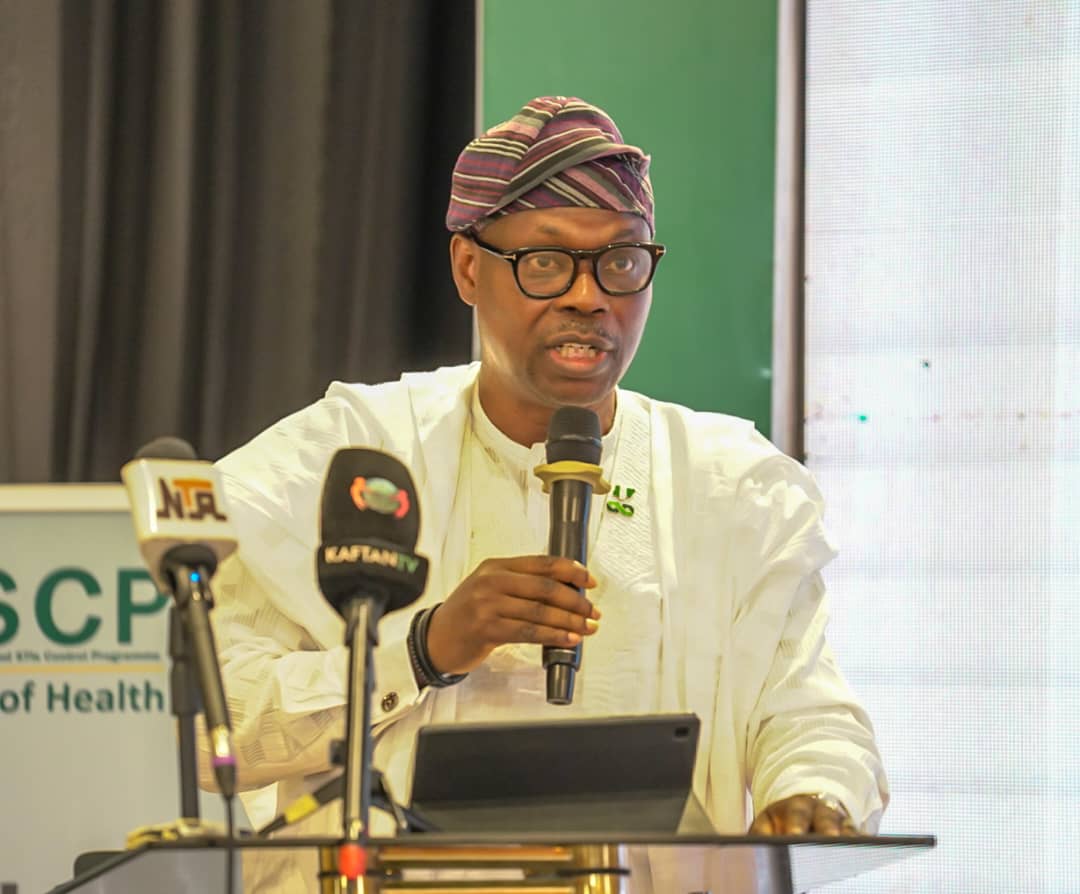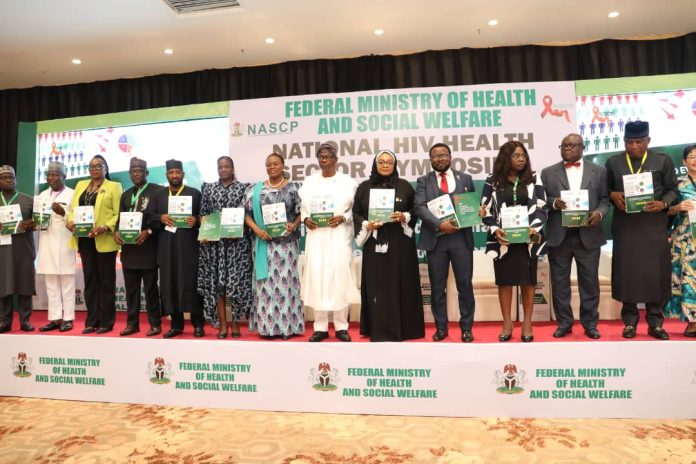By Emmanuella Oghenetega
The Federal Government has renewed its commitment to ending pediatric HIV in Nigeria and scaling up access to Prevention of Mother-to-Child Transmission (PMTCT) services, as it led stakeholders at the National HIV Health Sector Symposium to unite behind a common goal of eliminating new HIV infections among children.
Speaking at the symposium held at the Abuja Continental Hotel, the Minister of State for Health and Social Welfare, Dr. Iziaq Adekunle Salako, emphasized that the elimination of pediatric HIV remains a top national health priority, calling it a “State of Emergency” that will persist “until no Nigerian child is born with HIV.”

Dr. Salako highlighted progress made in the national HIV response, including increased PMTCT and early infant diagnosis coverage rates, which rose to 66% and 57% respectively in 2024, and a dramatic leap in pediatric ART coverage from 29% to 74% within the same year.
Despite these gains, he acknowledged that Nigeria still contributes over 9,000 new pediatric HIV infections annually, making it one of the worst-affected countries globally.
“This is a clear call to action,” Dr. Salako stated. “We must identify and treat every child living with HIV and ensure no pregnant woman is left without timely antiretroviral care. The fight is not over until we achieve universal access to HIV services and eliminate new infections in children.”
“Science exists. The tools are available. What remains is the will to scale up what works and reach those left behind,” said Dr. Salako. “We will not rest until every Nigerian child is born HIV-free.”
The symposium also featured remarks from the First Lady of Nigeria, Senator Oluremi Tinubu, represented by the Minister of Women Affairs. she reaffirmed her commitment to the “Free to Shine” campaign, an African Union-led initiative targeting the triple elimination of HIV, syphilis, and hepatitis among mothers and children.
The First Lady stressed that more must be done to ensure HIV testing is accessible in every hospital and that all exposed infants are tested and treated without stigma.
“Nigeria has made commendable progress, but sadly, one in every five children born with HIV in the world is Nigerian,” the First Lady said in her address. “No child should be born with HIV, and no mother should be left behind.”
She called for full implementation of the Triple Elimination Strategy and emphasized the importance of women’s access to quality, stigma-free care.
Speaking earlier, the Permanent Secretary Daju Kachollom, represented by Pharmacist Olubunmi Aribeana Director Food & Drugs Services Department in the Ministry asserted that the Federal Ministry of Health is deeply committed to strengthening our health care delivery platforms to make HIV services strong and accessible, equitable and sustainable.
The event drew participation from key development partners, including the United Nations Children’s Fund (UNICEF), the Clinton Health Access Initiative (CHAI), and the National Agency for the Control of AIDS (NACA), among others. UNICEF and CHAI underscored the urgent need to close treatment gaps, strengthen integration of HIV services, and support sustainable domestic responses amid declining global donor funding.
At the National HIV Health Sector Symposium, Dr. Adebobola Bashorun, Director and National Coordinator of the National AIDS and STI Control Programme (NASCP), outlined critical recommendations aimed at advancing the elimination of mother-to-child transmission (PMTCT) and improving paediatric HIV treatment coverage in Nigeria.
Key Recommendations amongst others are:
1. Integrated Testing and Treatment for Pregnant Women:
Ensure that all women receiving antenatal care from skilled providers have access to integrated testing for HIV, Syphilis, and Hepatitis B.
Guarantee the availability of test kits and appropriate medicines at antenatal care service delivery points for women diagnosed with any of the three infections.
2. Improve Access for Women Without Skilled Antenatal Care:
Increase awareness and accessibility of antenatal services for women who do not attend or rely on unskilled care providers.
Expand interventions to eliminate vertical (mother-to-child) transmission among underserved populations.
3. Develop a Triple Elimination Framework:
NASCP is collaborating with stakeholders to establish a Triple Elimination Framework targeting the concurrent eradication of HIV, Syphilis, and Hepatitis B transmission from mother to child.
4. Scale Up Early Infant Diagnosis (EID):
Leverage Point-of-Care (POC) platforms, such as mPIMA and GeneXpert, to improve early detection of HIV in infants and facilitate prompt linkage to Antiretroviral Therapy (ART).
5. Strengthen HIV screening and referral mechanisms within Reproductive, Maternal, Newborn, Child, and Adolescent Health (RMNCAH), as well as nutrition and immunization services, especially at the Primary Healthcare (PHC) level.
Dr. Bashorun emphasized that these measures are vital to achieving Nigeria’s national and global targets for HIV elimination, particularly among vulnerable women and children.
NACA Director-General, Dr. Temitope Ilori, and other stakeholders echoed the government’s call for increased collaboration, data-driven strategies, and community-led solutions to sustain progress and achieve the 2030 goal of ending HIV/AIDS as a public health threat.
The Federal Ministry of Health reaffirmed that under the Renewed Hope Agenda of President Bola Ahmed Tinubu, the government is “walking the talk” by scaling HIV services, providing free antiretroviral treatment to over 1.7 million Nigerians, and increasing domestic investments, including a recent emergency allocation of $200 million for HIV, malaria, and tuberculosis in response to global funding cuts.
The symposium ends with a unified pledge by government officials, development partners, civil society organizations, and healthcare professionals to push for an AIDS-free generation through intensified action, innovation, and accountability.


